On The Record with Pac-12 Network’s Chris Dorst
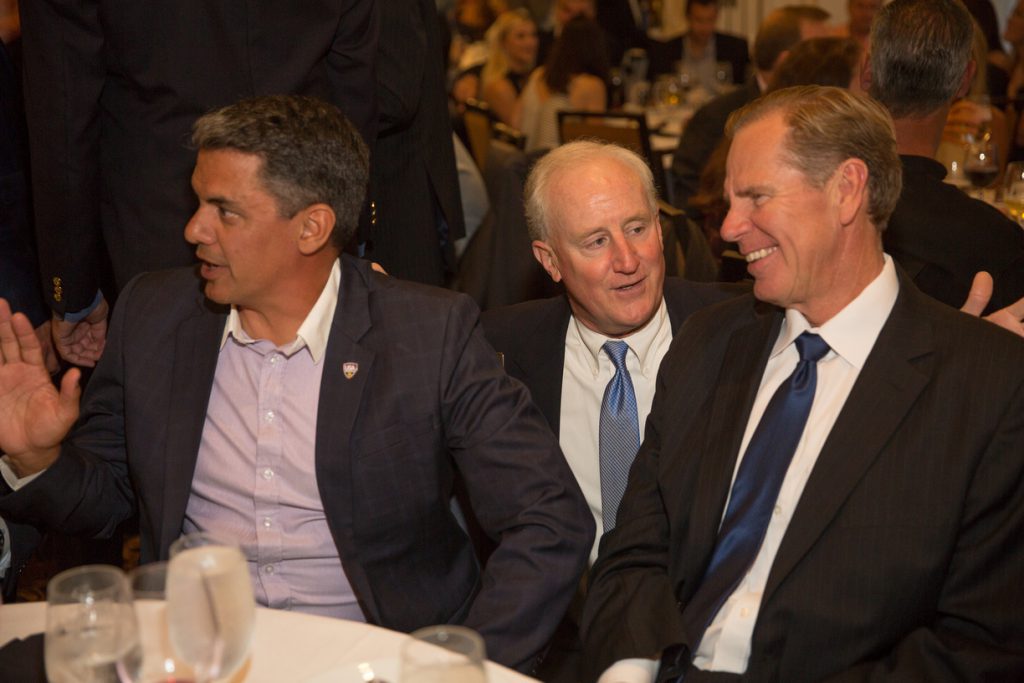
By Michael Randazzo, Swimming World Contributor
The Cutino Awards Dinner has been held at The Olympic Club in San Francisco for the past 19 years—and Chris Dorst has been at every single one, leading one of the greatest celebrations in American water polo. Which is just as it should be, because if Pete Cutino—the legendary UC-Berkeley coach—is the right guy for an award named after him, and The Olympic Club is the right place for the banquet, then Dorst is the right guy to emcee the event.
A Stanford graduate who represented the U.S. in the 1984 Olympics, Dorst is a graduate of Menlo-Atherton High School, just outside of Palo Alto. Spurning his parents—both Cal graduates—and Cutino himself, Dorst chose to take up with the Cardinal. It was a fateful choice; in 1976 Dorst was the goalie—and tournament most outstanding player—when Stanford won its first-ever NCAA water polo championship.
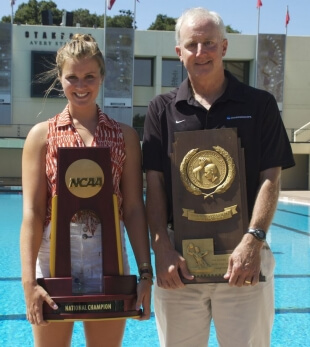
Emily, Pete Dorst w/NCAA hardware. Photo Courtesy: Palo Alto Online
Affected by President Jimmy Carter’s boycott of the 1980 Moscow Olympics, Dorst and his Team USA teammates got their chance to shine in the Los Angeles Olympics four years later. On their way to a silver medal, the Americans didn’t drop a match but lost out by goal differential to a Yugoslavian team coached by Ratko Rudic.
Settling down in the Bay Area, Dorst and his wife Marybeth—an NCAA champion swimmer at Stanford—have three daughters, all of whom followed their father into polo. Becca Dorst was recently named the Collegiate Water Polo Association’s 2018 Coach of the Year by for leading Princeton’s women’s team to the CWPA final. Dad also is no slouch; he is a member of the Stanford Athletic Hall of Fame as well as USA Water Polo’s Hall of Fame
A longtime broadcaster covering water polo for the Pac-12 Network, Dorst spoke with Swimming World prior to last Saturday’s Cutino Awards Dinner.
– You will again be the emcee for the Cutino Awards at The Olympic Club.
It’s exciting, not just because you’ve got the two best players in collegiate water polo—they only pick two but you’ve got six or seven [nominees]… these great athletes, great kids.
There’s usually a segment honoring legends of the past, when we trot out a bunch of former greats, whether it’s a collegiate team or a national team. Ten or so years ago it was the Olympic Club team from 1958 that won the club’s first national championship, with seven or eight Division I college coaches in their ranks.
Jim Gaughran, Rich Donner, Bob Goran and Andy Burke were part of that group—this all-star team of coaches who happened to have played the game.
You’ve got that and you’ve got the high school kids as well. There’s this upwelling not only of talent but an appreciation for what a cool thing [this event is.]
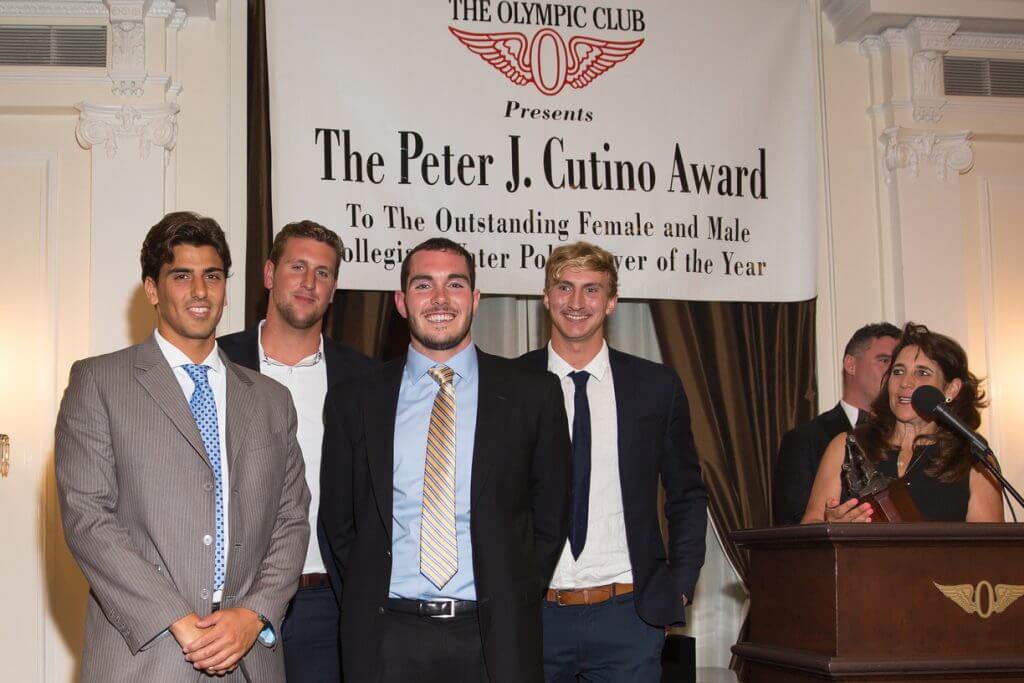
Luca Cupido, Alex Roelse, Matt Farmer, Luke Pavillard, Anna Cutino. Photo Courtesy: Catharyn Hayne
There’s an authenticity—no sponsors!—to this ceremony that appears to have been lost with other major college athletic awards.
I don’t know that we’ll ever succumb to that, though we’ve seen a lot of changes in the last 30 – 40 years. The fact that this really is a community—you’ll see the same faces year-in and year-out, guys who played against each other and now their kids compete. Everyone’s hugging each other and saying what a great time it is.
I’m sure things like that happen in other sports, but with water polo being a bit under the radar from a national media stand point, there’s something special about being here to celebrate excellence at a lot of different levels, a lot of different ages.
Talk about the involvement of high school athletes; it’s unusual to have such a mixture of ages at an awards ceremony of this magnitude, but this is part of what makes the Cutino Awards special.
As part of the evening we recognize the high school teams in the area that won their sectional championship—Central Coast Section (CCS) and North Coast Section (NCS). We celebrate teams from as far south as San Jose and as far East as… one team Sir Frances Drake in Marin County, another team the East Bay.
We offer the coach and the seniors to attend and invite them to stand up. Not every team accepts; there’s obviously limitations to what we can do. But you typically have four or five tables of high school kids who are in the room with their legends—Tony Azevedo and Ashleigh Johnson and JW Krumpholz.
It’s: “Wow! There he is!” —or: “I didn’t recognize him with all his clothes on…”
You have people who have come here as honorees who were here as high school kids. There’s a generational element to it and an aspirational element as well.
If you had asked us 20 years ago when we were setting this up, I can’t say we had this in mind. It was pretty much the Heisman Trophy for water polo. It’s developed into something more than that, like a crazy backyard barbecue with a bunch of your friends, most of whom you would have invited but some of whom just heard about it and showed up any way.
-What was Coach Cutino like?
Pete recruited me. I’m a kid from Menlo Park and in 1973, the Cal teams were in the middle of a run that was historic. They really were the gold standard in early NCAA championships. And their teams were just big and rugged. They played hard, and it was a style of water polo that set Cal apart and set Pete apart.
It was: this isn’t a finesse game. At the end of the day, whether you win or lose, you’ll know that you’re in a competition with a Pete Cutino-coached team.
My parents both went to Cal; my family’s got a long history in Berkeley. My dad said—when it came time to apply for college—that he would pay for the application for Berkeley but be damned if any son of his was going to Stanford.
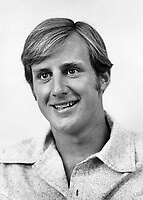
I paid the $25 to apply for Stanford, got in, went— and my little sister went as well. It took a while but we turned him to the point where he actually wore red to the games. It was towards the end of his life…it probably killed him faster!
I played for Pete for a couple of summers after graduating, just because national team guys were training [at Cal]. And I couldn’t have more respect for a coach.
It wasn’t just that he did things the right way, and that there was tremendous loyalty. It was [that he told you]: This is what you need to do to compete at this level and this is what you need to do to compete for me. There were no shortcuts. To be considered part of that program, everybody had to pay the same price.
I enjoyed the way he came at things—every single year when I’d see him, he’d put his arm around me and say: “Dorsty, how are you doing!” but there’d always be that: “Stanford guy” jab there somehow. Pete was a big guy. I’m not sure that people can tell from the pictures; he was a good 6-3 with a big, bald head.
He represented the best of what the sport had to offer—and the fact that the award is in his name, not in the name of some of the other great coaches [is] absolutely perfect.

The Olympic Club. Photo Courtesy: Catharyn Hayne
– Why is it fitting that The Olympic Club has hosted Peter Cutino Award every year?
It’s the oldest athletic club in California—maybe in the country. This place has a history of investing in water polo. There’s that ‘58 team that was a cradle of coaches for college water polo. There’s a sense that some place on the West Coast drives the sport. The LA area just doesn’t have a place of the magnitude, the gravitas to be able to lend its name to an award like this.
I just think this is the right place at what was the right time. Of course, Pete coached here at the end of his career and a lot of guys who had played for him are playing in the master’s program. I don’t know if there’s a groundswell of appreciation for polo in any other city. Orange County, Eastern LA—they’re hot beds of water polo, but I couldn’t see there being a Bob Horn award or a Monte Nitzkowski award.
In this place in this time with this saturation of water polo that Pete was the right guy at the right time.
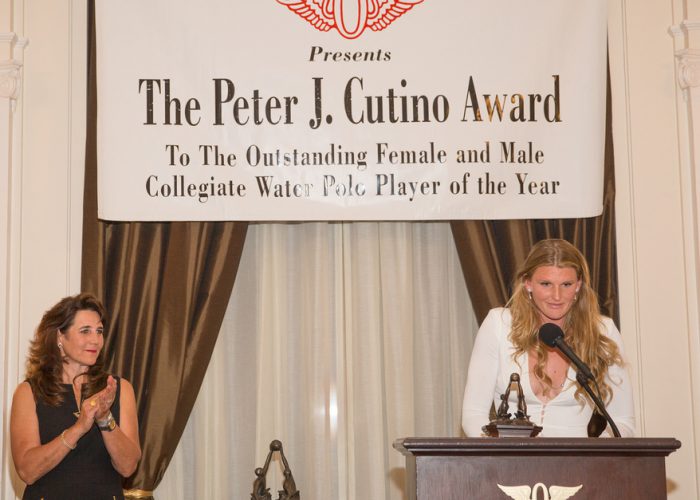
Amanda Longan with Anna Cutino. Photo Courtesy: Catharyn Hayne
– You’re probably the only person who’s been to every Cutino Award presentation. What stands out from those 19 years of memories?
There’s been an awful lot of great athletes. The ones who win and the ones who don’t; I was a collegiate athlete and never did I have that clarity of thought—they’re articulate, they look you in the eye.
Early on, Pete would get up and say a few words, and when you look back at some of the things he said—it was some serious wisdom from a guy who had lived it and had gone through an awful lot of success and plenty of failures. The more that we can hear those words, the better it’s going to be for everybody.
We had Leon Panetta speak, we had Peter Uberroth speak. Don Fisher of Gap—a bunch of the greatest coached: [Art] Lambert was here, Nitzkowski was here. [Terry] Schroeder spoke as well.
– And tonight you’ve got Tony Azevedo. Could there be a better representative of the sport in America?
His bio says his mission is to grow the sport. He’s already done quite a bit! I’m old enough to have played against his dad, Ricardo.
Nobody has the perspective on world water polo that Tony Azevedo has. For him to not only see it as his mission as giving back—which I think everyone in a small way does—right guy, right time, right message.
I’m looking forward to what he says tonight and looking forward to the next chapter.
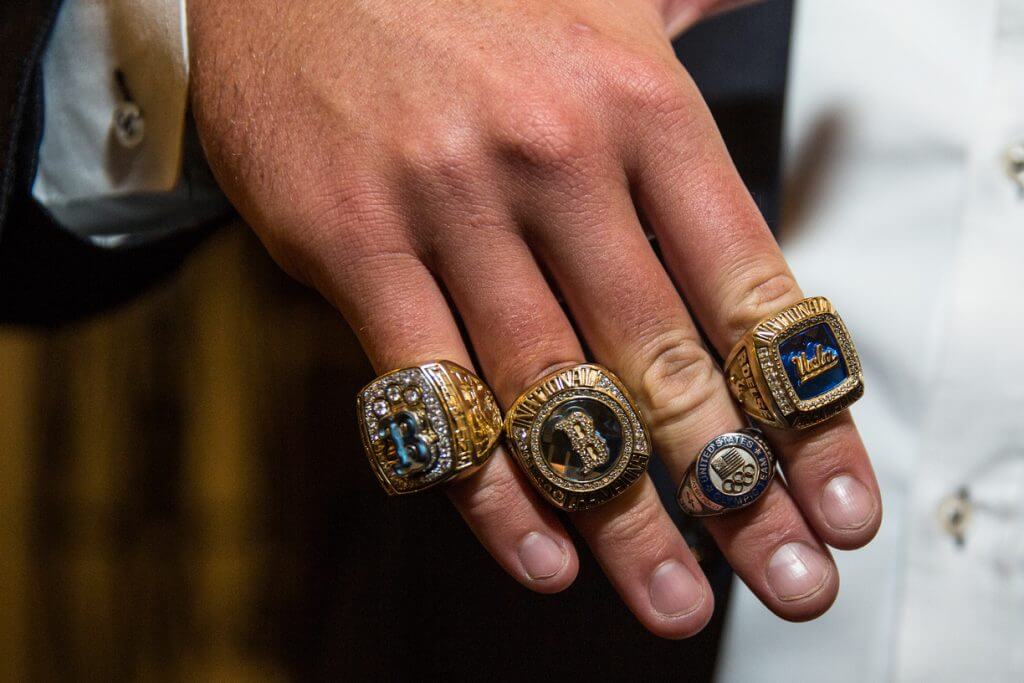
Alex Roelse’s rings for three NCAA championship and the Rio Olympics. Photo Courtesy: Cathryn Hayne
– Part of the interest in this year’s awards presentation is the controversy over last year’s selection of Ashleigh Johnson over Maggie Steffens.
Maggie’s a two-time FINA world’s women’s player of the year. Every year she played at Stanford—which I think spanned seven years because she took two years off for the Olympics—her reputation obviously proceeded her. She could not have had a more stellar collegiate career. Every year you kept thinking: Okay, this is the year that she’ll finally win.
Senior year, they win the NCAAs on a last second shot—and everyone who knows water polo knows it’s coming from Maggie. They set up a play, she gets it, she scores, Stanford wins. I’m not sure how much more you need to do from a resume-building point. That’s like the Heisman moment.
It was a surprise—taking nothing away from Ashleigh, who is one of the most dignified people. She had a great season.
Maggie’s dad, Carlos, played for Pete Cutino. Maggie’s uncle played for Pete. Maggie’s godfather played for Pete. The Cutino family and the Steffens family and the Schnugg family—which is her mom’s side—Pete Schnugg was on my 1980 Olympic team; he was the most valuable player for the NCAAs in 1973. If there’d been a Cutino Award then, he’d have won it.
At Pete’s funeral, Maggie’s dad was the keynote speaker who talked about being some scrawny kid from Puerto Rico. There was lots of history there.
But, this gets voted on not by The Olympic Club, not by folks in Northern California; every single collegiate coach in America votes on this award. Those are the people who decided Ashleigh deserved it more than Maggie did.
I’m sure it was disappointing to the Steffens family. What more do you need to do to earn something? But that’s why they have a vote.
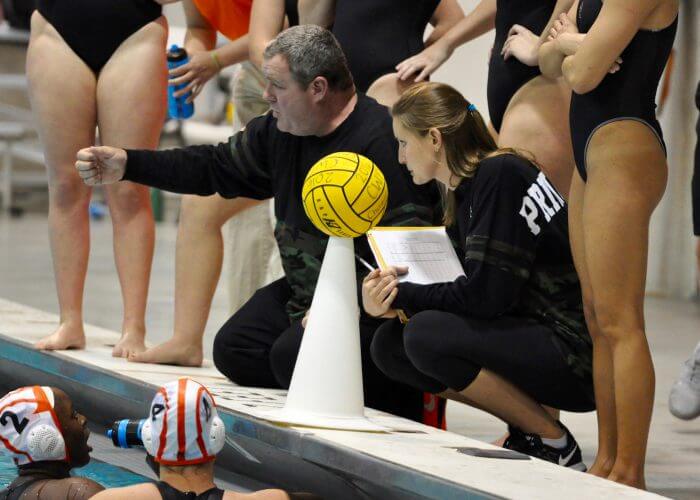
Becca Dorst with Luis Nicolao. Photo Courtesy: Princeton Athletics
– I’d be remiss if I didn’t ask about the job your daughter Becca did leading the Princeton women’s program this spring.
She coached far better than I ever could. I couldn’t be prouder of how she did.
I’m not disappointed that she’s going into nursing and not coaching. People are gifted in certain ways and she’s a gifted teacher. But also, when she was coaching with Louie [Nicolao; former Princeton coach] she was the bad cop. He was happy-go-lucky and out in front encouraging people, and Becca’d pull them aside and say: We’ve got expectations. I need you, body, mind soul and spirit.
She was never the truth-teller but when she went to UCLA she toughened up and did a lot of leading by example. I could not have been more impressed with her ability to do and say the right things.
And there wasn’t a lot of jumping around. I’d be screaming at the referees and lamenting something; [Becca] could cut through the chaos and communicate.
Communicating in the moment; that’s what coaching is. It’s also planning over the course of the season.
The success that she had came from the beginning of the season; [after the news that Nicolao was gone sunk in]—she met individually with every player and said: “I’m not sure I expected this; you didn’t expect this either. Let’s make the best out of it.”
I think that helped the team relax and perhaps play better than they should have.



